Cross, Creation, and The Powers:
The Public Theology of Sharon Delgado
Patheos PT 5005
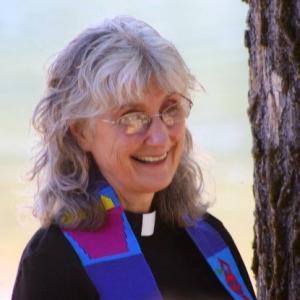
Sharon Delgado: Pastor, Theologian, Activist.
If you have not met Sharon Delgado or read her works, you’re in for a treat. Sharon incarnates what it means to be a progressive Christian like a freshly ripened peach incarnates heavenly nectar.
I first met Sharon when she was writing her master’s thesis on environmental ethics in Berkeley, where I teach. Sharon was a pastor in the United Methodist Church, ready to sound the trumpet. She was ready to call those Methodists to wake up and smell the roses beneath the stench of air pollution. First, the Methodists. Then, the world.
Today, Sharon Delgado is founder and director of Earth Justice Ministries. Along the way she’s authored gripping theological books and blog posts that will knock your socks off. Sharon follows Jesus, prays, preaches, marches, and makes a joyful noise that disturbs the powers of domination. Sharon is an activist who teaches the way of Jesus by example.
This is Part One of the Public Theology of Sharon Delgado. Watch for Part Two. It’s coming.
If you want more resources on Public Theology, click here.
Question 1. Sharon Delgado, you are a Progressive Christian. What does “progressive Christian” mean?
Sharon Delgado. My blog, Progressive Christian Social Action, is an expression of public theology or “street theology,” written to engage people in church and beyond in dialogue about social issues and the common good from the perspective of Christian faith. So yes, I am a progressive Christian. But, that category is broad. It includes people with a variety of spiritual experiences and beliefs. The definition on the Progressive Christianity website is simple and clear: “Progressive Christianity is an open, intelligent and collaborative approach to the Christian tradition and the life and teachings of Jesus that creates a pathway into an authentic and relevant religious experience.”
I more often think of myself as a follower of Jesus, whose passion for the reign of God led to his confrontation with the powers and to his death. The spiritual path I seek to follow is informed by Jesus’s life and teachings as portrayed in scripture, by the presence of the risen Christ, and by the tangible activity of the Holy Spirit, which I understand to be universally present throughout creation as “the Soul of the universe” (Wesley).
I am convinced that faith requires an open mind. People from all walks of life have been my teachers. What I have learned from biblical scholarship, varied spiritual traditions, evidence-based science, and other fields of inquiry is integrated into my work. People of many spiritual paths and secular philosophies live in ways that express the Love that undergirds creation and embody hope through their compassionate and just actions. In my organizing for peace, justice, and the regeneration of creation, I seek community and solidarity with anyone who has similar goals, especially with those most impacted by the violence and injustice of our time.
My writings point to faith that inspires action in response to the social issues of our day. I emphasize what God can do in and through us to bring about both personal and social transformation. This emphasis is a remedy for the apathy, paralysis, and despair that so many people feel when considering the multiple crises we face in our world today.
Question 2. Sharon Delgado, you are an activist. What specific social action matters do you personally deal with?
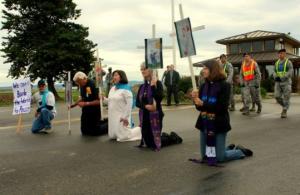
Sharon Delgado. My activism has always been an expression of my faith. I began campaigning against nuclear weapons in the late 1970s, soon after I had come to Christ and been baptized. The first time I was arrested for civil disobedience was at the Nevada test site following a Good Friday service there. I was the mother of young children at the time. One morning when my husband and children were out, I was listening to a cassette tape of Helen Caldicott talking about the psychological impacts of nuclear war on Hiroshima survivors. I identified with the people she was describing and imagined my own family in that situation. Suddenly a thought struck me, and I fell to my knees: “What must God feel about what we humans are doing to each other?” To this day I believe that God is deeply grieved by the harm we inflict on our human family and the rest of creation, and by the institutions and systems we support that perpetuate such harm.
Now I am a grandmother, and the issues I address still feel personal to me, especially because our choices today disproportionately impact our young and will extend generations into the future. I continue to give priority to existential threats to creation, primarily climate change, and to identify with people who are on the receiving end of injustice and violence. I contribute what I can from a faith perspective to furthering the movement for climate justice, but this is deeply connected to my work promoting participatory democracy that can lead to systemic change. This has led me to a decades-long focus on the corporate domination of our political and global institutions, and more recently to the dangers posed by anti-democratic forces such as white Christian nationalism, amplification of “the Big Lie” that the 2020 election was stolen, and the widespread restriction of voting rights.
I also continue to work on issues of peacemaking, racial justice, LGBTQ+ inclusion, Indigenous rights and the rights of nature, and other issues as they present themselves. Right now, I am working with a coalition in my small Northern California town to stop the reopening of an old gold mine that would almost double the carbon footprint of our area. Whatever the specific issue, I show the connections between today’s social, economic, and environmental concerns and the institutional powers that perpetuate them. I seek to awaken people to what is at stake in this historical moment and inspire them to take action that is proportional to the perils we face. To me, this means working to build a grassroots peoples’ movement that has power to bring about systemic transformation. In the words of climate activist Bill McKibben, “If we can build a movement, then we have a chance.”
Question 3. You are quite concerned about Christian nationalism. What is Christian nationalism? What do you perceive are its dangers? What does a movement like this do to classic Christian symbols?
Sharon Delgado. The cross is the primary symbol of Christian faith. Yet, people understand its meaning in different and sometimes contradictory ways. In The Cross in the Midst of Creation, I critique ancient atonement theories and the crass ways they are expressed today, the theological cruelty that uses scripture to justify harsh and unjust policies, and the teachings of Christian nationalism. These portrayals of Christianity are often deterministic, situating God at the top of worldly systems of power. They reflect the values of status, wealth, and power over others, the very values that Jesus rejected. Instead, I suggest a process of open inquiry and discernment grounded in prayer and based on biblical metaphors, including the stories of Jesus, that reflect a God who is with those who are “at the bottom” and are suffering at the hands of worldly systems of power, as Jesus did, a God of compassion, justice, inclusion, reconciliation, and peace.
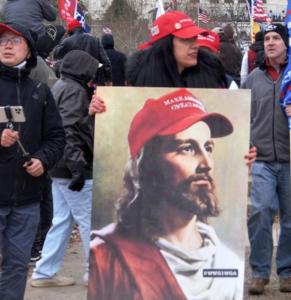
Today’s Christian nationalism links patriotism, white supremacy, and domination backed by violence with claims of God’s blessing upon the United States as a chosen (Christian) nation. It assumes Christian superiority and supports Christian hegemony as good, right, and normal. From the perspective of Christian nationalism, being American and being Christian are inseparable, and only by safeguarding our “Anglo-Protestant” roots will we protect our identity and freedom as Americans. Such views lead to discrimination and sometimes fuel violence against religious and racial minorities, the nonreligious, LGBTQ+ people, and others. This is the antithesis of the gospel.
The violence of Christian nationalism was demonstrated when rioters stormed the Capitol on January 6, 2021. On display were several large crosses, Bibles, and other Christian symbols that were used (alongside symbols of violent hate groups) as religious justification for violent actions in support of antidemocratic nationalism and white supremacy. Using religious symbols in these ways misleads people, misrepresents God, and fosters moral confusion. The white supremacist message of Christian nationalism is a distortion and misuse of the message of Jesus. Instead of truth it offers a lie, instead of healing it causes harm, instead of peace it brings violence, instead of love it promotes hate. It turns the good news of Jesus into bad news and brings further violence, injustice, and oppression to those who are already suffering.
In The Cross and the Lynching Tree, James Cone offers an antidote to such distortions when he writes, “The real scandal of the gospel is this: humanity’s salvation is revealed in the cross of the condemned criminal Jesus, and humanity’s salvation is available only through our solidarity with the crucified people in our midst” (Cone, 2013, p. 160). As followers of the nonviolent and compassionate Jesus, we are called to repent, resist, and advocate for those who are being crucified on the cross of white supremacy and other forms of dominating violence today.
Question 4. Ever since I got to know you, I’ve perceived your passion for rescuing Planet Earth from the forces that would destroy its beauty and deprive us of its fecundity. Corporate globalization today looks like the Bible’s “principalities and powers” of yesterday. Explain how you view this.
Sharon Delgado. Yes, I have been passionate about “rescuing” (if only) God’s beloved creation, including human beings, from the forces of destruction. And yes, I identify those forces in terms of the biblical “powers and principalities,” which manifest today in a variety of ways, most notably in the system of corporate globalization.[1]
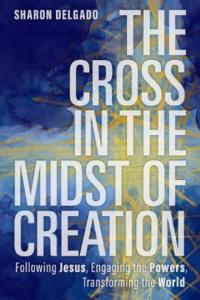
One reason I wrote the Cross in the Midst of Creation was to make the case that eco-theology and an ethic of stewardship and creation care are not enough to motivate people in our churches to take unified action to address the catastrophic threat to creation. A theology of creation, a theology of the cross, and a theology of the biblical “powers and principalities” need to intersect, for concerns about God’s creation must be at the heart of the gospel and must be reflected in our understanding of atonement and salvation.
What does salvation look like in today’s context? “It cannot mean simply saving individual people out of this world and leaving everyone else to live on a progressively degraded earth. Surely the God who created abundant life wants it to continue and flourish. Salvation must include release from the apathy, moral confusion, and hopelessness that characterize our time. It must mean personal transformation that gives us hope and equips us for loving action in the world, for God’s intention is the liberation and reconciliation of all creation” (Delgado, The Cross in the Midst of Creation: Following Jesus, Engaging the Powers, Transforming the World, 2022, pp. 95-96).
My understanding of the biblical “powers and principalities” has been influenced by William Stringfellow and Walter Wink, who interpreted these terms not as disembodied spirits floating around in space, as people may have believed in ancient times, but as the outer manifestations and inner dimensions of “authorities, corporations, institutions, traditions, processes, structures, bureaucracies, ideologies, systems, sciences, and the like” (Stringfellow, 1973, p. 77). My work focuses primarily on the representative human beings, institutions, and systems that dominate the world, expressed in contemporary terms as the powers that be or simply the powers.
“These dominating powers are meant to serve a positive purpose by bringing order to life but are sinful (“demonic”) to the degree that people give ultimate loyalty to these less-than-ultimate institutions, loyalty that is solely due to God. Together they dominate our cultural, social, economic, and political lives. By reflecting and reinforcing this world’s disordered values and systems of thought, these institutional powers cause great harm. At the same time, this structural disorder is reflected and reinforced by individuals, for the powers are present in our psyches, and we are part of the whole” (Stringfellow, 1973, p. 168).
“Walter Wink also spoke of the domination system, meaning the interlocking network of political, social, economic, military, and religious/ideological institutions that dominates the world in different historical eras… In biblical times, the empires of Babylon and Rome embodied the domination system” (Wink, 1992, p. 46). The most obvious manifestation of the domination system today is the interlocking network of global bureaucracies, national governments, transnational corporations, and other institutions that make up the overarching system of corporate globalization. This global system is based on unrestrained free-market capitalism, dominated by corporations and “dark money,” propelled by capital flows, powered by fossil fuels, enforced by militarism, legitimized by powerful global institutions, and justified by secular and religious ideologies. It is an idolatrous system that has grown beyond human control.
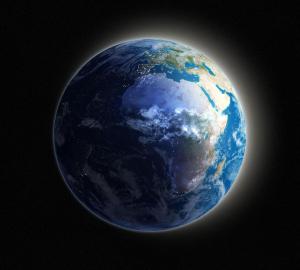
The forces that drive this system harm creation.
“The insatiable appetite of this global system of wealth-driven corporate capitalism continues to devour the earth, turning its gifts into commodities, defiling its goodness, decimating our human and other-than-human companions, reducing prospects for future generations, and diminishing our humanity….The dominating powers enact policies that wreak havoc among human beings as ecosystems collapse, communities disintegrate, inequity grows, violence multiplies, and militarism expands. The web of life unravels as the global system of unregulated free-market capitalism consolidates its control over the planet. The multifaceted crisis we face today is the direct result of a global system that has grown beyond human control and has taken on a life of its own. To the degree that the institutions that make up this system harm human beings or destroy God’s creation, they stand opposed to God and should be resisted and called to account” (Wink, 1992, p. 178).
As people who seek to live by the faith of Jesus, the good news must equip us to call the powers back to their role to serve rather than dominate life and inspire us to participate in the ongoing story of God at work in the world (Wink, 1992, p. 185).
Why are we talking to Sharon Delgado?
We are talking to Sharon Delgado because she provides guidance by example of how to think and act as a public theologian.
Like an opera libretto, I’ve been presenting on stage before a Patheos audience a cast of leading public theologians around the world. Each sings a slightly different song, but together there is a level of harmony that seeks only growth in harmony.
The Public Theology of Rudolf von Sinner
The Public Theology of Katie Day
The Public Theology of Binoy Jacob
The Public Theology of Robert Benne
The Public Theology of Paul Chung
The Drumbeat African Public Theology of Mwaambi G Mbûûi
The Public Theology of Valerie Miles-Tribble
The Public Theology of Kang Phee Seng
The Public Theology of Jennifer Hockenbery
Karen Bloomquist: Another Worldview Must Be Enacted Today
My own view—as regulars have heard perhaps ad nauseum—is that public theology is conceived in the church, critically reasoned in the academy, and offered to the world for the sake of the common good.
What’s Next?
We’re now ready for Part Two of Sharon Delgado’s interview on public theology. Get ready to click.
▓
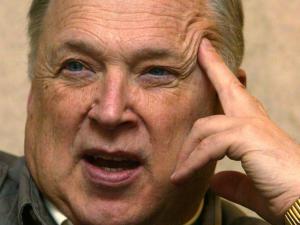
Ted Peters pursues Public Theology at the intersection of science, religion, ethics, and public policy. Peters is an emeritus professor at the Graduate Theological Union, where he co-edits the journal, Theology and Science, on behalf of the Center for Theology and the Natural Sciences, in Berkeley, California, USA. His book, God in Cosmic History, traces the rise of the Axial religions 2500 years ago. He previously authored Playing God? Genetic Determinism and Human Freedom? (Routledge, 2nd ed., 2002) as well as Science, Theology, and Ethics (Ashgate 2003). He is editor of AI and IA: Utopia or Extinction? (ATF 2019). Along with Arvin Gouw and Brian Patrick Green, he co-edited the new book, Religious Transhumanism and Its Critics hot off the press (Roman and Littlefield/Lexington, 2022). Ted has just published The Voice of Public Theology (ATF 2022). See his website: TedsTimelyTake.com.
This fictional spy thriller, Cyrus Twelve, follows the twists and turns of a transhumanist plot.
▓
[1] Sharon says: “I have written extensively about this, especially in Shaking the Gates of Hell: Faith-Led Resistance to Corporate Globalization, which includes an overview of the global economy and the movement for global justice, sometimes called “globalization from below.” (Delgado, 2007)References
Cone, J. (2013). The Cross and the Lynching Tree. Maryknoll NY: Orbis.
Delgado, S. (2007). Shaking the Gates of Hell: Faith-Led Resistance to Corporate Globalization. Minneapolis MN: : Fortress.
Delgado, S. (2022). The Cross in the Midst of Creation: Following Jesus, Engaging the Powers, Transforming the World. Minneapolis MN: Fortress.
Peters, T. (2021). Public Theology, Discourse Clarification, and Worldview Construction. Theology and Science 19:1, 1-4; DOI.org/10.1080/14746700.2020.1869672 .
Stringfellow, W. (1973). An Ethic for Christians and Other Aliens in a Strange Land. Waco TX: Word.
Wesley, J. (n.d.). Sermon 23: 3rd Discourse on the Sermon on the Mount. http://wesley.nnu.edu/john-wesley/the-sermons-of-john-wesley-1872-edition/sermon-23-upon-our-lords-sermon-on-the-mount-discourse-three.
Wink, W. (1992). Engaging the Powers. Minneapolis MN: Fortress.













